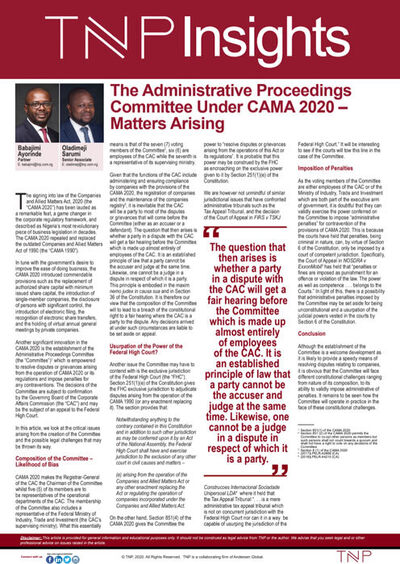Introduction
The signing into law of the Companies and Allied Matters Act, 2020 (the “CAMA 2020”) has been lauded as a remarkable feat, a game changer in the corporate regulatory framework, and described as Nigeria’s most revolutionary piece of business legislation in decades. The CAMA 2020 repealed and replaced the outdated Companies and Allied Matters Act of 1990 (the “CAMA 1990”).
In tune with the government’s desire to improve the ease of doing business, the CAMA 2020 introduced commendable provisions such as the replacement of authorized share capital with minimum issued share capital, the introduction of single-member companies, the disclosure of persons with significant control, the introduction of electronic filing, the recognition of electronic share transfers, and the holding of virtual annual general meetings by private companies.
Another significant innovation in the CAMA 2020 is the establishment of the Administrative Proceedings Committee (the “Committee”)[1] which is empowered to resolve disputes or grievances arising from the operation of CAMA 2020 or its regulations and impose penalties for any contraventions. The decisions of the Committee are subject to confirmation by the Governing Board of the Corporate Affairs Commission (the “CAC”) and may be the subject of an appeal to the Federal High Court.
In this article, we look at the critical issues arising from the creation of the Committee and the possible legal challenges that may be thrown its way.
Composition of the Committee – Likelihood of Bias
CAMA 2020 makes the Registrar-General of the CAC the Chairman of the Committee whilst five (5) of its members are to be representatives of the operational departments of the CAC. The membership of the Committee also includes a representative of the Federal Ministry of Industry, Trade and Investment (the CAC’s supervising ministry). What this essentially means is that of the seven (7) voting members of the Committee[2], six (6) are employees of the CAC while the seventh is a representative of its supervising ministry.
Given that the functions of the CAC include administering and ensuring compliance by companies with the provisions of the CAMA 2020, the registration of companies and the maintenance of the companies registry[3], it is inevitable that the CAC will be a party to most of the disputes or grievances that will come before the Committee (either as an accuser or a defendant). The question that then arises is whether a party in a dispute with the CAC will get a fair hearing before the Committee which is made up almost entirely of employees of the CAC.
It is an established principle of law that a party cannot be the accuser and judge at the same time. Likewise, one cannot be a judge in a dispute in respect of which it is a party. This principle is embodied in the maxim nemo judex in causa sua and in Section 36 of the Constitution. It is therefore our view that the composition of the Committee will to lead to a breach of the constitutional right to a fair hearing where the CAC is a party to the dispute. Any decisions arrived at under such circumstances are liable to be set aside on appeal.




